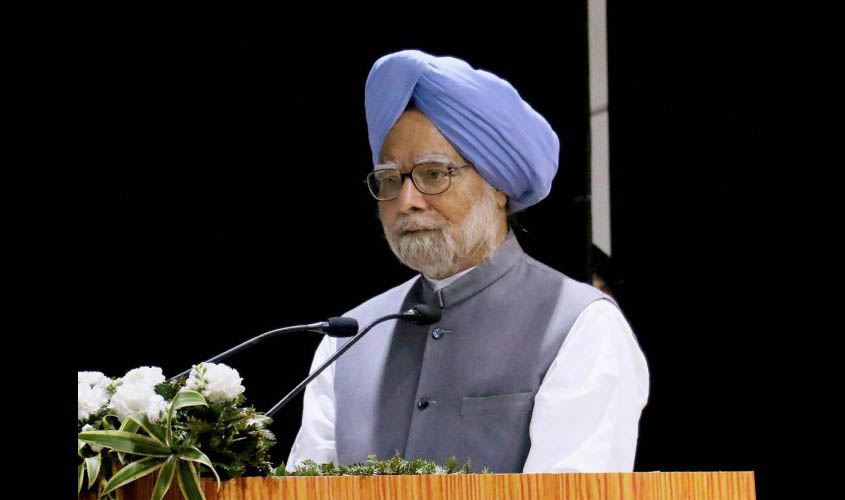Former Prime Minister Manmohan Singh’s observation, that the anti-Sikh riots in 1984 could have been avoided had the then Home Minister P.V. Narasimha Rao immediately called in the Army, has created an enormous political controversy. Singh expressed his opinion during the centenary function of the late Inder Kumar Gujral, also a former PM, who had advised Rao to summon the Army on the evening of 31 October, after Indira Gandhi had been brutally assassinated by her own Sikh security guards.
Singh’s comments have largely been interpreted as a feeble attempt to shift the onus of the anti-Sikh riots from Rajiv Gandhi to Rao. Rajiv Gandhi had assumed the office of the Prime Minister on the night of his mother’s killing, and the genocide commenced after Arun Nehru had reportedly told some Congress activists to “teach them (Sikhs) a lesson”, while Indira Gandhi’s bullet-riddled body was still at the All India Institute of Medical Sciences.
There was a total breakdown of the law and order machinery in the capital as goons singled out Sikhs, setting them on fire after burning down their houses. The Delhi police was totally demoralised, given that its personnel had gunned down the Prime Minister in cold blood, and thereby failed to prevent the ghastly massacre. It is true that Rao was the Home Minister, and thus, could not be absolved of the responsibility, but the fact of the matter is that Rajiv was the Prime Minister.
The then Home Secretary, M.M.K. Wali was appointed the Lt Governor to replace P.G. Gavai, who was unable to pass appropriate instructions, besides the fact that the Police Commissioner Subhash Tandon had lost control over his force. The functioning of the Police Control Room was in a mess, and the majority of IPS officers were unable to ensure the safety of Sikhs against whom rage was allowed to build up by vested interests. A few months later, at the Boat Club, while addressing a rally, Rajiv Gandhi sought to justify the violence by stating that whenever a big tree falls, tremors can be felt all around.
The outrageous anti-Sikh riots will go down in history as the darkest chapter of Independent India. The Army was eventually called in, and the situation was brought under control by the Gorkhas, who patrolled the streets, making it clear that disruptive elements would not be spared. It was not Rao alone who had failed to protect the Sikhs, but Prime Minister Rajiv Gandhi was equally responsible.
It is now for Singh to clarify that his statement holding his own mentor Rao responsible for the genocide was made consciously and not inadvertently. If this was the view held by Singh, why did he join Rao’s Cabinet as the Finance Minister? Yes, Singh and Gujral hailed from the Jhelum district of undivided Punjab, and therefore shared a deep bond. However, to assume that Gujral’s counsel to Rao could have averted the riots is not an accurate depiction of how events unfolded.
Singh, undoubtedly, is an economist of great repute, whose experience should be utilised by the present government to find a reasonable solution to the economic crisis engulfing the country. However, his proclivity of pleasing his political bosses does not reflect well on him. In 1991, soon after Rao inducted Singh into his Cabinet, former Prime Minister Chandra Shekhar was rather critical of the move.
At a dinner hosted in his honour by a group of journalists at the NDMC officers’ club near the All India Radio, Chandra Shekhar demonstrated his disapproval by lashing out at Rao and Singh. When some journalists told him that Singh was also amongst his advisers when he was the PM, Chandra Shekhar infuriatedly retorted, “aaloo katne ke liye chaku kharida tha, lekin koi uss se heart surgery karani shuroo kar de, toh main kya chup rahunga (had acquired a knife to peel potatoes, but if someone tries to perform heart surgery with it, will I remain silent)?”.
Singh has perfected the art of survival, managing to always keep the Gandhis on his right side. He has often been used by Sonia Gandhi to come to the defence of her family and therefore it was not surprising that he chose to hit out at his guru, Rao, in order to shield Rajiv Gandhi from the 1984 riots. He remained mum when Rahul Gandhi had torn the ordinance promulgated by his government while Singh was on a foreign visit. Any self-respecting Prime Minister would have tendered his resignation over this public humiliation.
Rao was a politician and not totally above board either. In fact, one matter he could have actually attended to was to prevent the demolition of the disputed Babri Masjid structure in Ayodhya. He had been forewarned, much in advance, of the proposed plan of VHP kar sevaks by both Makhan Lal Fotedar and Arjun Singh, yet he sat on the information without taking any pre-emptive measures. It was in this context that many of Rao’s critics described him as the BJP’s first Prime Minister. However, no one disputes that Rao was an accomplished
He was pragmatic, having his priorities in order; the foremost being to set the economy right, for which he inducted Manmohan Singh. Incidentally, the Chandra Shekhar government—of which Gujral was also an extended part—had contributed to the economic crisis, which at the time was pulling the country down. It was unbecoming of Singh to have dragged his guru into this unsavoury controversy. Between us.

